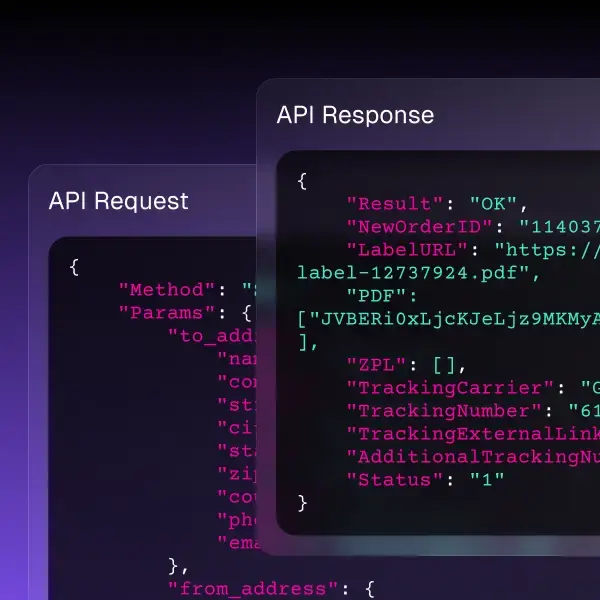What is warehousing? A guide for e-commerce businesses

For many ecommerce businesses, warehousing is a key part of the storage and distribution process. As your business grows, so does your need for space. Finding the right warehouse and processes for your needs can be a tricky task for first-time business owners, but this guide will break down the basics to help you find the perfect storage solution.
What is warehousing?
Warehousing is the process of temporarily storing goods in a physical space for sale and distribution. All kinds of people and industries use warehouses; including wholesalers, manufacturers, importers and exporters, etc. Items are temporarily held in the warehouse before being shipped to their new or final destination. It is typically not a permanent storage solution but some warehouses may hold items longer than others.
Within a warehouse there are many different moving parts; including logistics, processes and storage options to consider. The location of the warehouse also plays a factor in determining what’s best for your unique businesses. In conclusion, warehousing is something all businesses
Importance of warehousing for online businesses
For online businesses and ecommerce, warehousing is an important component of the sales process. Most medium-sized businesses are unable to store all their inventory in the office or at home, so for this reason access to a warehouse is invaluable.
For online businesses, warehouses are vital for a number of reasons beyond just storage. Warehouses also provide effective inventory management. Offering business owners a central location to store goods allows ecommerce companies to maintain sufficient stock levels and avoid stockouts or overstocking situations. Keeping track of inventory in real-time lets businesses to optimise processes in order to fulfil customer orders promptly and minimise delays. If you plan on scaling your business, warehouses are key for that too. They provide the necessary space to store growing volumes of products, enabling businesses to scale operations easily and accommodate for busy seasons like Christmas and Black Friday.
On the technical side, warehouses deal with a lot of the complex logistics that come with distributing goods. Warehouses help businesses streamline transportation and shipping processes, and deal with logistics such as returns and inventory management. Warehouses should also guarantee product protection; keeping your items stored safely with proper shelving, packaging and security measures to help prevent damage, theft or other issues.
Warehouses also offer online businesses the opportunity for international expansion. Establishing warehouses in other countries and regions increases access to new customers and supports scalability. It also reduced shipping costs, delays and other logistical challenges that come with expanding into new markets.
What do warehouses offer online businesses?
Warehouses offer a variety of operations, services and processes vital to the supply chain. For many online businesses, access to a reliable, efficient and well-equipped warehouse is a key part of the distribution process — so what processes and operations do warehouses offer?
Receiving and storing inventory
The first process a warehouse provides is receiving inventory and storing it safely for customers. This involves receiving incoming shipments, inspecting them for damages, updating inventory systems and organising items into their designated storage locations.
Inventory tracking and management
Using modern technology such as WMS and other software, items that enter the warehouse are tracked and managed. This is a vital aspect of warehouse management because it helps customers manage their stock levels, rotate stock as necessary and keep records of what goes in and out of the warehouse. Effective warehouse tracking and management is an important part of the supply chain.
Order fulfilment and shipping
When a customer places an order through an ecommerce website, the order is then sent to the warehouse to be packed and shipped. Picking and packaging is another important warehouse function. Warehouse personnel receive information about the item they need to ship, and locate it within the warehouse. Some warehouses will use automated systems like robots or conveyors. Once the items have been located and “picked”, they are then packaged, labelled and shipped to their destination.
Shipping and returns management
Another benefit of using a warehouse is that it will handle all your returns and exchanges for you. Warehouses prepare shipping documentation, arrange transportation and load goods onto trucks or other carriers for delivery. In addition to shipping, warehouses handle returns. When an item is sent back, warehouses handle the reverse logistics process. This includes whether the item is to be restocked, repaired, disposed of. Inventory is updated and customer refunds or replacements are issued.
Types of warehouses
Depending on who you ask, there are many different types of warehouses — and it’s important to know the difference so you can choose the one that’s right for you and your business.
Distribution Centres
Fulfilment centres tend to be bigger than traditional warehouses and are designed to move larger quantities of goods in a shorter amount of time. They tend to be located close to transportation hubs to increase efficiency, and leverage technology such as cutting edge warehouse management systems (WMS) or automated picking tools to optimise the flow of goods through the centre and onto their final destination. They are an important part of the supply chain, and are particularly useful to online businesses who need to move large amounts of stock quickly.
Consolidated Warehouse
For a more economic option, consolidation warehouses might be a good choice. These warehouses collect small shipments from many different suppliers within one geographical location and combine them into a bigger shipment to send out within a specified area. This kind of warehouse is useful for new businesses or startups with smaller amounts of stock.
Smart Warehouse
These warehouses are completely automated with tech such as AI, robots and drones. Futuristic smart warehouses are becoming increasingly popular with large ecommerce platforms who are looking to make their distribution process more accurate, more streamlined and less reliant on a human workforce.
Public Warehouses
Public warehouses tend to be a more cost effective option for new businesses or those with a smaller amount of stock. They are usually owned by a governmental or third-party entity. Public warehouses are a bit more basic than some of the other options out there, but they are an affordable option for smaller ecommerce or seasonal businesses who only wish to store goods for a short amount of time. They usually won’t be as technologically equipped as other options, but they are an attractive option for casual use.
Private Warehouses
Private warehouses (also known as proprietary warehouses) are warehouses owned by a company entity who have secured the space, facilities, management and maintenance upfront. While a more expensive option, private warehouses are popular with wholesalers, distributors and manufacturers. They tend to offer more control over inventory management and are a great option for more exclusive and region-specific business operations.
Cold Storage Warehouse
If your online business sells temperature sensitive products such as frozen food or perishable items, then you will want to find a warehouse that can accommodate your specific needs. Cold storage warehouses do just that; they are warehouses used to store items that need to be kept at a certain temperature. This ensures that all inventory is kept safe and inventory isn’t spoiled by sitting in a normal warehouse for longer than planned.
On-Demand Warehouse
On-demand warehousing has become increasingly popular with the rise of ecommerce. On-demand warehousing / storage connects online businesses with warehouses that have an excess of space. They are perfect for businesses dealing with a sudden spike in sales and are cost effective for seasonal inventory.
Choosing the Right Warehouse
Now that you’re aware of the various kinds of warehouses there are out there, it’s easier to get a sense of which warehouse is right for your business needs. There are a number of factors that should be considered when searching for the best storage facility.
- Location: This is one of the most important things to consider when looking for a warehouse. You want to make sure it’s strategically situated to minimise transportation costs and reduce delivery times. It’s important to consider proximity to suppliers, customers, major transportation routes and hubs in your decision.
- Product needs: If you sell products with specific needs such as perishable inventory, antiques, rare items, etc then you want a warehouse that can handle your goods with care.
- Size and Scalability: You will need to evaluate the size of your inventory to determine how much space you need. It is also important to factor in any projected growth to ensure the warehouse can accommodate any future needs. You want to choose a warehouse that allows for scalability and flexibility so it can adapt as your business grows.
- Technology: Modern warehouses should be well equipped with technological capabilities and systems that work to minimise errors, optimise processes and streamline operations. These systems include an up-to-date WMS and ERP, automated picking processes, RFID tracking, pick-to-light systems, etc.
- Infrastructure: You should look into warehouses with adequate security (CCTV, alarms), fire safety, loading docks, climate control and other necessary and important infrastructure to keep your products safe and in the best condition while passing through the warehouse.
- Cost: Cost is a big factor when considering warehousing options. Cost factors to consider include rent, utility costs, maintenance expenses, insurance and other additional fees that come with warehouse management.
- Reputation: Word-of-mouth recommendations are always the best way to assess whether a warehouse is efficient and reliable. A good track record is important when considering warehousing, and testimonials from other similar businesses are a good way to assess customer satisfaction levels.
Efficient warehousing provides online businesses with access to important tools which massively enhance the distribution process, inventory management and improve customer experience.</p
Emily Browne is a writer for ShippyPro who blends her passion for writing with an interest in all things e-commerce. Emily strives to make complex topics more digestible, proving that the world of logistics isn't as confusing as it sometimes feels! Her expertise in supply chain management, coupled with a knack for storytelling, helps readers navigate the complex world of e-commerce and shipping.









